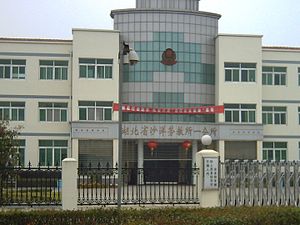
Re-education through labor (RTL; simplified Chinese: 劳动教养; traditional Chinese: 勞動教養; pinyin: láodòng jiàoyǎng), abbreviated laojiao (simplified Chinese: 劳教; traditional Chinese: 勞教; pinyin: láojiào) was a system of administrative detention in mainland China. Active from 1957 to 2013, the system was used to detain persons who were accused of committing minor crimes such as petty theft, prostitution, and trafficking of illegal drugs, as well as political dissidents, petitioners, and Falun Gong followers. It was separated from the much larger laogai system of prison labor camps.
Sentences under re-education through labor were typically for one to three years, with the possibility of an additional one-year extension. They were issued as a form of administrative punishment by police, rather than the judicial system. While they were incarcerated, detainees were frequently subjected to a form of political education. Estimates of the number of RTL detainees on any given year range from 190,000 to two million. In 2013, approximately 350 RTL camps were in operation.[1]
On 28 December 2013, the Standing Committee of the National People's Congress abolished the re-education through labor system and detainees were released.[2][3] However, human rights groups have claimed that other forms of extrajudicial detention have taken its place, with some former RTL camps being renamed drug rehabilitation centers.[4]
In 2014, re-education facilities were constructed in Xinjiang and they were used to target a wider context than people who were accused of committing minor crimes and political dissidence.[5] By 2017, these had become the massive Xinjiang internment camps holding 1–3 million people, utilizing forced labor, now recognized as re-education camps by many nations and intergovernmental organizations such as the UN,[6][7][8][9][10] EU,[11][12][13][14][15] and human rights groups.[16][17][18][19]
- ^ "Long overdue: The government says it will reform its system of labour camps". The Economist. 12 January 2013. Retrieved 8 November 2016.
- ^ 全国人民代表大会常务委员会关于废止有关劳动教养法律规定的决定 (in Chinese). 28 December 2013. Retrieved 26 May 2016.
- ^ Moore, Malcolm (9 January 2014). "China abolishes its labour camps and releases prisoners". The Telegraph. Retrieved 26 May 2016.
- ^ Amnesty International, "CHINA: “CHANGING THE SOUP BUT NOT THE MEDICINE?” : ABOLISHING RE-EDUCATION THROUGH LABOUR IN CHINA" (Dec 2013), p 35
- ^ "New Evidence for China's Political Re-Education Campaign in Xinjiang". uhrp.org. Archived from the original on 25 October 2019. Retrieved 15 May 2018.
- ^ Aoláin, Fionnuala Ní; et al. (1 November 2019). "REFERENCE: OL CHN 18/2019" (PDF). Office of the United Nations High Commissioner for Human Rights.
- ^ "UN experts call for decisive measures to protect fundamental freedoms in China". Office of the United Nations High Commissioner for Human Rights. Retrieved 23 February 2021.
- ^ "Independent UN rights experts call for decisive measures to protect 'fundamental freedoms' in China". UN News. 26 June 2020. Retrieved 23 February 2021.
- ^ "China: UN experts deeply concerned by alleged detention, forced labour of Uyghurs". United Nations Human Rights Office of the High Commissioner. 29 March 2021.
- ^ "Rights experts concerned about alleged detention, forced labour of Uyghurs in China". UN News. 29 March 2021. Retrieved 1 July 2021.
- ^ Gerin, Roseanne (21 February 2020). "EU Seen Turning Tough Rhetoric Into Action on Abuses Against Muslim Uyghurs in China". Radio Free Asia. Retrieved 23 February 2020.
- ^ "Texts adopted – Situation of the Uyghur in China (China-cables) – Thursday, 19 December 2019". Europarl.europa.eu. Retrieved 23 February 2020.
- ^ "Texts adopted – Forced labour and the situation of the Uyghurs in the Xinjiang Uyghur Autonomous Region – Thursday, 17 December 2020". European Parliament. 17 December 2020. Retrieved 17 December 2020.
- ^ "US and Canada follow EU and UK in sanctioning Chinese officials over Xinjiang". the Guardian. 22 March 2021. Retrieved 23 March 2021.
- ^ "Transatlantic allies unite in sanctions on China over Xinjiang". Nikkei Asia. Retrieved 23 March 2021.
- ^ "China: Massive Crackdown in Muslim Region". Human Rights Watch. 9 September 2018. Retrieved 9 September 2018.
- ^ "Interview: China's Crackdown on Turkic Muslims". Human Rights Watch. 9 September 2018. Retrieved 9 September 2018.
- ^ "CAIR Condemns U.S. Chinese Embassy for Celebrating Uyghur Genocide on Twitter, Calls on Platform to Remove 'Horrific' Tweet – CAIR – Council on American-Islamic Relations". 8 January 2021. Retrieved 9 January 2021.
- ^ ""Like we were enemies in a war" China's Mass Internment, Torture and Persecution of Muslims in Xinjiang" (PDF). Amnesty International. 2021. Retrieved 19 June 2023.